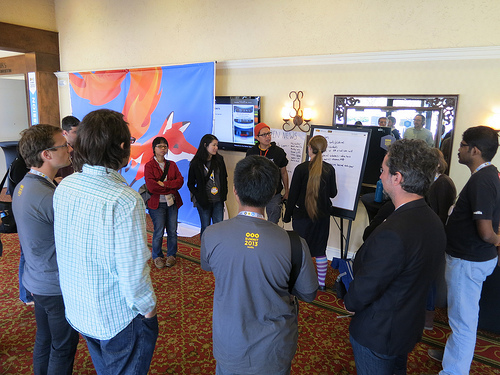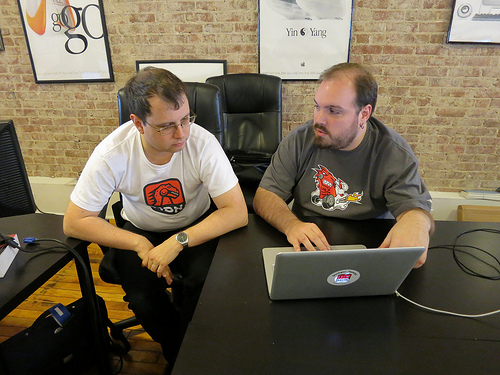For nearly a decade, the Mozilla Developer Network (MDN) has been a vital source of technical information for millions of web and mobile developers. And while each month hundreds of developers actively contribute to MDN, we know there are many more with deep expertise in the Web who aren’t participating—yet. Certainly MDN and the Web would benefit from their knowledge and skill, and we’re piloting a program to provide benefits for them as well.

Mozillians at Summit 2013. Photo by Tristan Nitot.
What it is
The MDN Fellowship pilot is a seven-week part-time (5-10 hours per week) education and leadership program pairing advanced web and mobile developers with engineering and educational experts at Mozilla to work on significant, influential web projects. Fellows will contribute by developing apps, API descriptions, and curriculum on MDN for their project. They will also receive hands-on coaching from project mentors, as well as others at Mozilla who will provide training and guidance on curriculum development, so that their work can be taught to others.
An overview of projects
Here’s a look at some of the technical topics and the associated project tasks we’ve identified for our first group of MDN fellows.
- ServiceWorkers essentially act as proxy servers that sit between web applications, the browser, and (when available) the network. They are key to the success of web apps, enabling the creation of effective offline experiences and allow access to push notifications and background sync APIs.
What you’ll work on: You’ll write a demonstration web app (new or existing) to showcase Service Worker functionality and provide detailed API descriptions. - WebGL is the latest incarnation of the OpenGL family of real-time rendering immediate mode graphics APIs. This year WebGL is getting some cool new features with the publication of standardization efforts around the WebGL 2.0 spec.
What you’ll do: Develop a curriculum on MDN for teaching the WebGL APIs developers new to graphics programming. - Web app performance. App performance is impacted by many factors, including serving content, rendering, and interactivity. Finding and addressing performance bottlenecks depends on tooling the browser networking and rendering but also (and often more importantly) user perception.
What you’ll do. Develop a curriculum on MDN for teaching developers to master performance tooling and to develop web apps with performance as a feature. - TestTheWebForward. Mozilla participates in an important W3C initiative, TestTheWebForward, a community-driven effort for open web platform testing.
What you’ll do: Review various existing technical specifications to identify gaps between the documentation and current situation. Refine existing tests to adapt to this cross-browser test harness. - MDN curriculum development. MDN serves as a trusted resource for millions of developers. In 2015, MDN will expand the scope of this content by developing Content Kits: key learning materials including code samples, video screencasts and demos, and more.
What you’ll do: Act as lead curator for technical curriculum addressing a key web technology, developing code samples, videos, interactive exercises and other essential educational components. You may propose your own subject area (examples: virtual reality on the web, network security, CSS, etc.) or we will work with you to match you based on your subject area knowledge and Mozilla priorities.
“I’m looking forward to working with a Fellow to make low-level real-time graphics more approachable,” says WebGL project mentor Nick Desaulniers. More information, including project mentors and the type of skills & experience required for each project, can be found on the MDN Fellowship page.

Photo by Tristan Nitot.
How to apply
If any of these projects sounds interesting, check out the website and apply by April 1. We’ll announce the fellows in May and start the program in June by bringing fellows and mentors together to get everyone familiarized with their projects and one another. Then, for 6 weeks, you’ll work directly with your mentor on your project from your home base. You’ll also receive ongoing feedback and coaching to set you up for success on teaching what you’re building to larger groups of developers.
Here’s a timeline:
- Now – April 1: Apply!
- April: Finalist candidates will be interviewed.
- May: Fellows are announced.
- June (dates & location TBA): Orientation at a Mozilla space.
- June 29 – August 3: Work on your projects + regular team calls to receive coaching on your work.
- August 11-12: Graduation
This program is for you if…
You code, document, and ship with confidence, and now you’d like to start sharing your skills with a broader community. Maybe you want a way out of the walled garden and you’d like to contribute to Mozilla’s mission of keeping the web open for all. Perhaps you want to be effective at sharing your expertise with a wider audience.
Consider this program if you want an opportunity to:
- Amplify the impact of your technical expertise by contributing to influential, significant projects at Mozilla.
- Stretch your technical expertise by working closely with Mozilla technical mentors.
- Integrate educational best practices into your work with Mozilla teaching mentors.
Check out the MDN Fellowship website, apply by April 1, and encourage others as well!

Mozillians at Mozcamp Warsaw. Photo by Tristan Nitot
About Diane Tate
I joined Mozilla in 2011 to help run our WebFWD accelerator program. In 2013 I joined the Developer Relations group and in 2014 we focused on MDN specifically. Before Mozilla I worked at a bunch of startups and at Charles Schwab in product management, marketing and communications roles.


24 comments